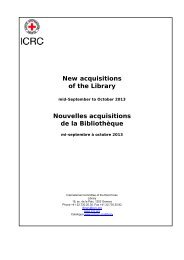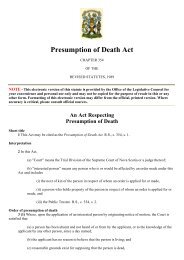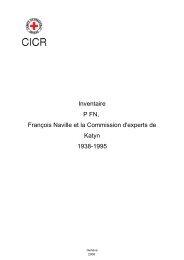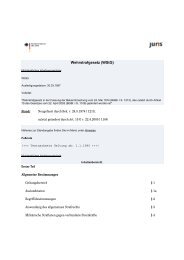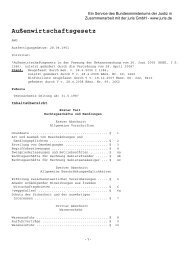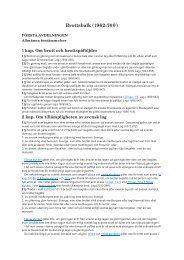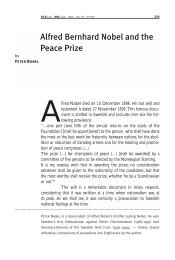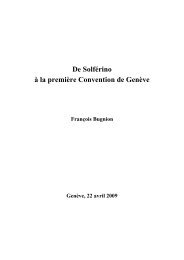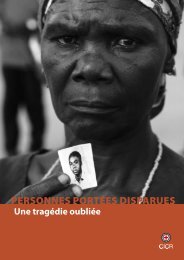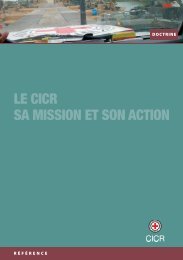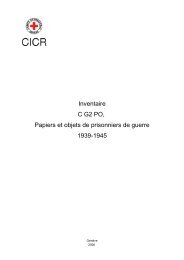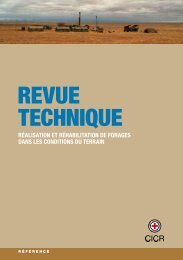ICRC Liberia newsletter - International Committee of the Red Cross
ICRC Liberia newsletter - International Committee of the Red Cross
ICRC Liberia newsletter - International Committee of the Red Cross
You also want an ePaper? Increase the reach of your titles
YUMPU automatically turns print PDFs into web optimized ePapers that Google loves.
Editorial<br />
“Continued Commitment to <strong>Liberia</strong>”<br />
Tobias Epprecht,<br />
Head <strong>of</strong> Delegation, <strong>ICRC</strong><br />
<strong>Liberia</strong> has witnessed some<br />
drastic changes over <strong>the</strong> last two<br />
years. Thanks to <strong>the</strong> relative peace<br />
and stability in <strong>the</strong> country,<br />
hundreds <strong>of</strong> thousand <strong>of</strong> <strong>Liberia</strong>ns<br />
are finally able to return to <strong>the</strong>ir<br />
counties <strong>of</strong> origin and to rebuild<br />
<strong>the</strong>ir shattered livelihoods. Often<br />
having to start from scratch <strong>the</strong><br />
returnees are also confronted with<br />
a near total lack <strong>of</strong> infrastructure<br />
in <strong>the</strong> areas <strong>of</strong> return.<br />
In order to assist <strong>the</strong> population in <strong>the</strong>ir<br />
difficult task, <strong>the</strong> <strong>ICRC</strong> has provided<br />
basic relief items as well as seeds<br />
and tools since 2004 in <strong>the</strong> various<br />
areas <strong>of</strong> return. This effort was doubled<br />
in 2005 where during <strong>the</strong> first half <strong>of</strong><br />
<strong>the</strong> year more than 1’600 metric tons<br />
<strong>of</strong> seeds were distributed to over 75’000<br />
families.<br />
Parallel to this <strong>the</strong> <strong>ICRC</strong> has<br />
reconstructed and rehabilitated a<br />
number <strong>of</strong> clinics and health centres in<br />
L<strong>of</strong>a and Grand Kru Counties. These<br />
very same health facilities are<br />
continuously supported through<br />
supplies <strong>of</strong> pharmaceutical drugs as<br />
well as providing training and paying<br />
salary incentives to <strong>the</strong> health staff.<br />
Never<strong>the</strong>less, besides <strong>the</strong> difficulty to<br />
access certain areas due to <strong>the</strong><br />
deplorable road conditions, one <strong>of</strong> <strong>the</strong><br />
main challenges faced by <strong>the</strong><br />
organization is <strong>the</strong> lack <strong>of</strong> trained health<br />
staff to run <strong>the</strong> rehabilitated clinics.<br />
As fur<strong>the</strong>r element in <strong>the</strong> <strong>ICRC</strong>’s effort<br />
to assist in <strong>the</strong> reconstruction <strong>of</strong> <strong>the</strong><br />
dilapidated infrastructure wells and<br />
latrines are constructed in <strong>the</strong> areas <strong>of</strong><br />
massive return.<br />
Besides <strong>the</strong>se very visible assistance<br />
programs, <strong>the</strong> <strong>ICRC</strong> is putting a lot <strong>of</strong><br />
effort into locating <strong>the</strong> families <strong>of</strong> some<br />
1’000 children separated from <strong>the</strong>ir<br />
relatives due to <strong>the</strong> past conflicts. Most<br />
<strong>of</strong> <strong>the</strong>se children are still living in a<br />
neighbouring country where <strong>the</strong>y are<br />
regularly visited by staff <strong>of</strong> <strong>the</strong> <strong>ICRC</strong><br />
Interview: Delivering Assistance in <strong>Liberia</strong><br />
One <strong>of</strong> <strong>the</strong> most serious challenges<br />
to <strong>the</strong> delivery <strong>of</strong> humanitarian<br />
assistance by <strong>the</strong> <strong>ICRC</strong> in <strong>Liberia</strong> is<br />
<strong>the</strong> state <strong>of</strong> rural roads across <strong>the</strong><br />
country especially during <strong>the</strong> rainy<br />
season. Delivering 15 trucks <strong>of</strong> rice<br />
and beans seeds to rural <strong>Liberia</strong><br />
during <strong>the</strong> rainy season between June<br />
and September is a mammoth task.<br />
Gerald Robertson is <strong>the</strong> outgoing<br />
<strong>ICRC</strong> convoyer charged with<br />
responsibility <strong>of</strong> delivering assistance<br />
in <strong>the</strong> field. He reflects on some <strong>of</strong><br />
<strong>the</strong> difficulties encountered travelling<br />
to rural <strong>Liberia</strong>. “The roads are in bad<br />
shape and those potholes and bumpy<br />
spots, patches <strong>of</strong> mud and dirt are<br />
everywhere.” he explains.<br />
“The holes are deep and slope so<br />
<strong>the</strong> vehicles slide heavily into <strong>the</strong><br />
bank and in o<strong>the</strong>r parts, it could<br />
slide <strong>of</strong>f <strong>the</strong> road”<br />
Dangerously, small mud spots have<br />
grown bigger with <strong>the</strong> rains and <strong>ICRC</strong>’s<br />
vehicles sometimes get stuck in <strong>the</strong>m.<br />
These road conditions have made it<br />
impossible to deliver assistance by<br />
truck <strong>the</strong>refore <strong>the</strong> <strong>ICRC</strong> has employed<br />
<strong>the</strong> use <strong>of</strong> <strong>the</strong> smaller four-wheel Toyota<br />
2 - <strong>ICRC</strong> Bulletin No.6 September 2005<br />
delegations in Guinea, Sierra Leone or<br />
Ivory Coast. Once reunited with <strong>the</strong>ir<br />
relatives, families in need are supported<br />
with material assistance in order to<br />
facilitate reintegration <strong>of</strong> <strong>the</strong> child.<br />
As a final but never<strong>the</strong>less important<br />
element in <strong>the</strong> organization’s<br />
assistance to <strong>Liberia</strong> is <strong>the</strong> support to<br />
its local partner <strong>the</strong> <strong>Liberia</strong>n National<br />
<strong>Red</strong> <strong>Cross</strong> Society (LNRCS). Toge<strong>the</strong>r,<br />
<strong>the</strong> two organizations are for instance<br />
able to deliver over 5’000 <strong>Red</strong> <strong>Cross</strong><br />
Messages every month to family<br />
members still separated by <strong>the</strong> past<br />
conflicts.<br />
While a lot has been done by <strong>the</strong> <strong>ICRC</strong><br />
as well as <strong>the</strong> various o<strong>the</strong>r<br />
humanitarian organizations working in<br />
<strong>Liberia</strong>, <strong>the</strong> need for continued support<br />
to <strong>the</strong> most vulnerable part <strong>of</strong> <strong>the</strong><br />
population still remains. Given this <strong>the</strong><br />
<strong>ICRC</strong> has already started preparations<br />
for <strong>the</strong> third consecutive large scale<br />
seeds and tools assistance program<br />
since <strong>the</strong> end <strong>of</strong> <strong>the</strong> conflict.<br />
With over 300 <strong>Liberia</strong>ns, 48 international<br />
staff and a budget for 2005 <strong>of</strong> close to<br />
US$ 25 million, <strong>the</strong> <strong>ICRC</strong> operation in<br />
<strong>Liberia</strong> is currently <strong>the</strong> organization’s<br />
Land Cruisers.<br />
Although <strong>the</strong><br />
Land Cruisers<br />
can plough <strong>the</strong>ir<br />
way through <strong>the</strong><br />
mud spots, it<br />
takes our<br />
experienced<br />
drivers more<br />
hours to cover a<br />
Gerald Robertson,<br />
<strong>ICRC</strong> Convoyer<br />
shorter distance. The makeshift bridges<br />
constructed <strong>of</strong> wood logs make it<br />
dangerous to use weighty trucks.<br />
Gerald has served <strong>the</strong> <strong>ICRC</strong> in Sri<br />
Lanka, Ethiopia, and Sudan.



